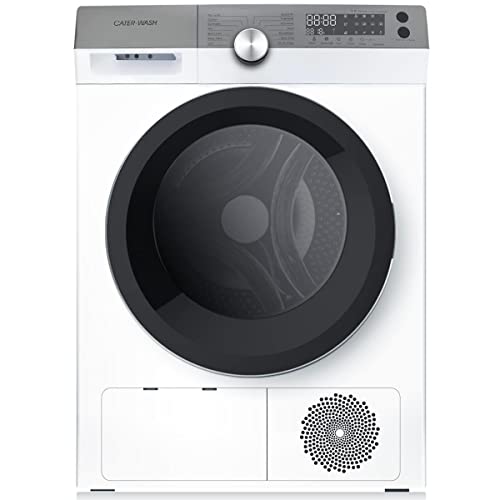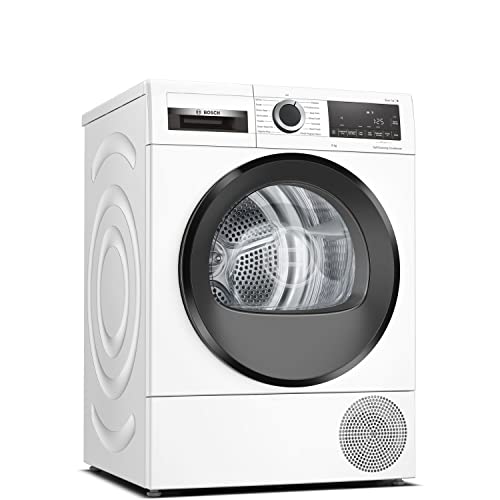Ten Startups That Are Set To Change The Dryers Heat Pump Industry For …
페이지 정보
작성자 Gilda 작성일24-03-02 06:38 조회40회 댓글0건본문
 Why Buy a Dryer With a Heat Pump?
Why Buy a Dryer With a Heat Pump?Like standard electric or gas dryers, heat pumps warm air and then pump it into the drum. Unlike them, however the warm air doesn't get released into the vents where it can cause problems like clogged and energy-intensive lint traps.
Ventless heat pump dryers can be set up anywhere, since they cool the air and remove moisture. Find out more about their advantages.
Energy Efficiency
They consume only a fraction of the energy that traditional vented dryers consume. They don't need to generate heat themselves like conventional dryers. Instead, they depend on a closed loop refrigerant system that's similar to an air conditioner. The air that flows through the evaporator coils of the dryer heats it and absorbs moisture. The moisture is then dripped into a pan that can be emptied manually or connected to a drainage tube. Then the cooled air moves back through the coils and begins the cycle again.
According to Energy Star, heat pump dryers use around two-thirds of the electricity per load as traditional dryers. They also require no venting and eliminate the possibility for lint accumulation in the dryer vent, which reduces the chance of fire. And since they're ventless, they can be used in any room that has access to an electrical outlet, which makes them ideal for apartments and other cramped spaces.
Additionally the energy efficiency of the heat pump dryer translate into lower utility bills. That's especially important given the rising cost of electricity. Even with the higher upfront purchase price of dryers with heat pumps, they typically pay for themselves in less than two years because of their significantly reduced operating costs.
Electric heat pump dryers consume less energy as well than condensing, non-heat pump dryers. Their cycles are longer than conventional dryers.
If you're serious about reducing your energy use then a dryer with a heat pump is the best choice. It's the most efficient method to perform laundry and can be powered by electricity produced by solar energy or other renewable sources. If you're moving to a completely electric home then a heat pump clothes dryer should be a element of your home. That's because it can be powered by the same renewable energy source that powers other appliances such as refrigerators and washers. As such, it can help you meet the target goal of an all-electric home by 2050.
Convenience
Many dryers that have heat pumps come with moisture sensors to help prevent overdrying and save energy. Some dryers have anti-wrinkle technology and smart settings that can be operated by smartphones. Certain ENERGY STAR certified models can even reuse the water used to eliminate humidity from the air during the drying process and save you money on disposal costs.
They also provide more flexibility than vented or ducted dryers as they do not require venting. They can be used in many different places, including attics or basements. The only downside is that they take longer to dry laundry than standard dryers that use electricity because they don't use the same amount of cheap heat pump tumble dryer.
Instead of using hot air to dry clothes like gas and electric dryers, heat pump dryers recycle the same air over and over again. A compressor presses refrigerant within one set of coils to release heat. Then, it moves through an expansion valve and into another set of coils, where it cools and absorbs moisture. The process repeats repeatedly until the load is completely dry. This is much more efficient than traditional dryers which use energy by continuously heating the air to dry laundry.
While they are a green choice however, they can be expensive at first. But, they'll pay for themselves over time by reducing your energy bills. Manufacturers often offer incentives and rebates to help offset the initial cost of the heat pump dryer.
Some heat pump dryers require a drain hose that is used to flush the water used to remove moisture from air and can increase the overall price of the device. This isn't an enormous drawback however it could be a major issue for some buyers.
The use of heat pump dryers has many advantages that are worth a look. They are gentler on fabrics, which can extend their lifespan, while also looking great. They also cost less and can reduce your energy costs by up to 28% compared to traditional dryers.
Durability
Created to cut down on energy costs by reusing heat from the air They are also more gentle on clothes and can aid in prolonging their life. They employ the same procedure as vented dryers to remove water from clothing, but they do not release humid air outside your home. They reuse air that has been cooled. They typically take longer to dry than traditional vented dryers because they operate at lower temperatures.
Since they don't require a vent, these Dryers heat pump can be put in any space that has electricity and a water source. This makes them ideal for small homes, accessory dwelling units (e.g. an apartment over the garage), and additions. Some models are small enough to fit in tight spaces, and some can be stacked together with a washer for added flexibility. Ventless heat pumps dryers with more capacity, which can earn an Energy STAR certification and are more robust.
These machines spin clothes inside an heated drum, much like traditional vented dryers. The hot drum heats up as the clothes spin and squeezes out the moisture. The water is then stored into a separate tank drain hose or a draining hose, which must be drained manually or automatically. Some dryers have a tank that needs to be drained every few cycles or more frequently, while others have a self-draining system that requires less maintenance.
Because they're more complicated than vented dryers and vented dryers, heat pump dryers have higher repair rates and are more costly to service. These machines are nonetheless worth the investment if you are looking to save money and reduce your utility bills.
The most important thing to take into consideration when deciding whether to buy a heat pump dryer is your laundry habits and budget. If you frequently wash laundry and like to get it dry quickly then a vented dryer would be the ideal choice for you. If you're looking to save money in the long run and don't want drying times of 2.5 hours, a heat-pump dryer is a good choice. These dryers are energy-efficient and can save you up to $2,600 per year. They also last twice longer than vented models.
Noise
Heat pump dryers tend to be quieter than traditional dryers, however noise levels can vary among brands and models. Knowing how noise levels are measured and comparing them can help consumers pick the right model for their requirements. If noise is an issue, it may be recommended to schedule your dryer at off-peak times when household activities and sleep patterns will be less disrupted. Also, placing the dryer in an area that minimizes vibration and isolating it from the floor with rubber pads or anti-vibration mats can help reduce noise.
The squeaking or grinding sound could indicate that the dryer drum is strained and struggling to turn. To avoid this, follow the manufacturer's instructions for Dryers Heat Pump the maximum capacity of the dryer and don't overfill it. Balancing larger items, like comforters and blankets, with a small amount of smaller items will improve performance and reduce the noise of grinding and squeaking during drying.
The sound of the dryer's heat pump technology pump gurgling is normal. It is a sign that the dryer is functioning as intended. If the sound gets louder or persists it could be an indication that your dryer's lint filters and vents are blocked and require cleaning.
It is important to clean regularly the lint filter as well as the dryer vent to keep them clear of obstructions and ensure an efficient heat pump dryer. This will help prevent noises during the drying cycle, and will prolong the longevity of the appliance.
 Certain heat pump dryers are advertised as operating on standard 120-volt 15-amp electrical circuits which can be useful for those who reside in older homes and have limited power outlets. This can be false advertising since most electric dryers require 220-volt circuits with 30-amps to work properly. A heat pump dryer that is running on a standard circuit will increase the chance of fire and electric shock. Therefore, it is always recommended to use an electrician who is certified to install the heat pump dryer within an existing home.
Certain heat pump dryers are advertised as operating on standard 120-volt 15-amp electrical circuits which can be useful for those who reside in older homes and have limited power outlets. This can be false advertising since most electric dryers require 220-volt circuits with 30-amps to work properly. A heat pump dryer that is running on a standard circuit will increase the chance of fire and electric shock. Therefore, it is always recommended to use an electrician who is certified to install the heat pump dryer within an existing home.댓글목록
등록된 댓글이 없습니다.
 즐겨찾기 추가하기
즐겨찾기 추가하기





 관유정 커뮤니티
관유정 커뮤니티